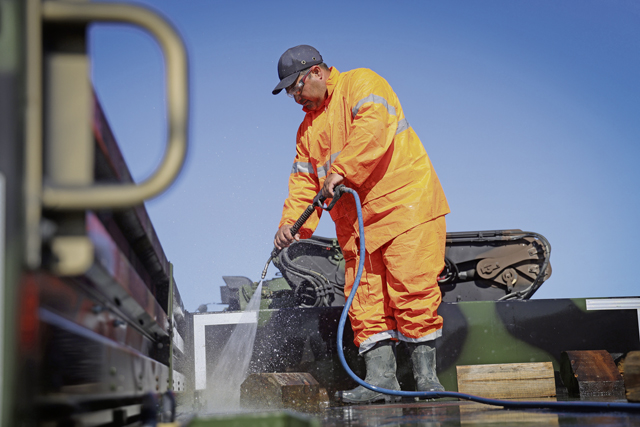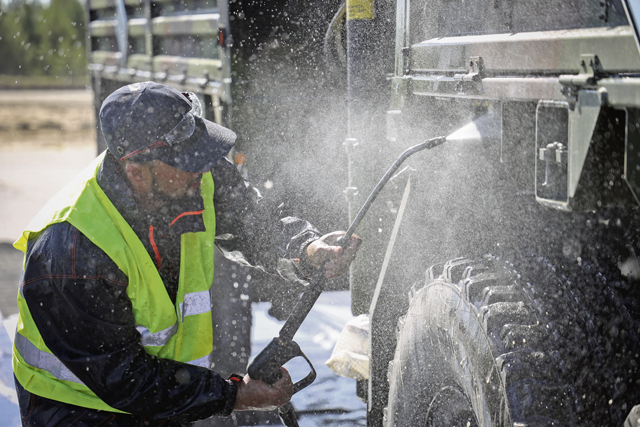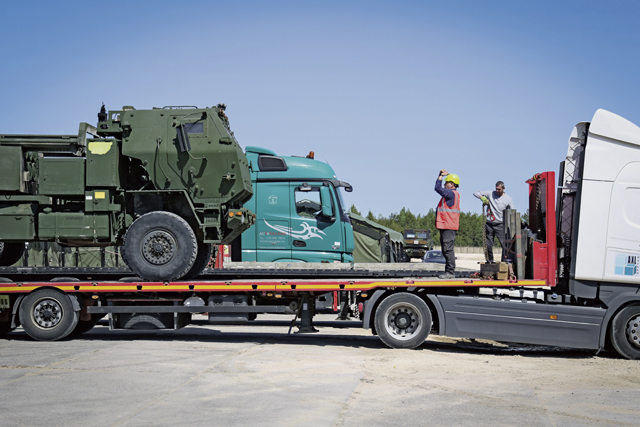
ADAZI, Latvia — In the scope of global biosecurity, the United States Army conducted an Agricultural African Swine Flu (ASF) Wash from May 20-22 here, where contractors cleaned vehicles and equipment with chemicals, which in turn plays a critical role in safeguarding Soldiers and civilians against the spread of African Swine Flu and other potential agricultural threats.
“An important part of our redeployment process back from Defender 23 is right here in Camp Adazi,” said Capt. Robert Rivera, an operations officer at 405th Army Field Support Brigade. “They’re sanitizing and cleaning our equipment so we’re able to ship it back to Germany, it’s beneficial not only to us but to the contractors out here that are conducting the wash itself.”
By conducting ASF washing and disinfection operations, the United States Army helps support and ensure regional biosecurity and upholds the commitment to protect Europe’s agricultural safety.

“The AFS wash is a regulation that has been passed down in Europe to prevent Africa’s swine flu virus that are in boars to be spread through other countries within Europe,” said Rivera. “Training here in the dirt and the sand, we have to make sure our equipment is clean and certified to go back to Germany, ensuring that we’re not spreading the virus.”
African Swine Flu is a highly contagious viral disease affecting domestic and wild pigs. The disease can be transmitted through direct contact with infected animals, but it can also spread through contaminated materials such as vehicles, equipment and personnel. To prevent the unintentional transmission of ASF, the wash takes proactive measures to thoroughly clean and disinfect military vehicles returning from various missions throughout Europe.
“There are a lot of moving components here, from humvees, M142 high mobility artillery rocket system, containers, forklifts and trailers,” said Rivera. “There are over 130 pieces being moved.”

With so many moving components, it’s important to have each piece of equipment and vehicle disinfected and with the strict protocols, it ensures the effective removal of any potential contaminants from military vehicles. A washing process is carried out to eliminate visible dirt, debris and organic matter. High-pressure water jets, specialized brushes and environmentally friendly detergents are utilized to cleanse the vehicles, paying close attention to the undercarriages, wheels and other hard-to-reach areas where contaminants can hide.
“As the redeployment process comes to an end here in Adazi, there is another process in Germany where the equipment is received, downloaded and then moved back to a maintenance phase,” said Rivera.
The ASF wash plays a critical role in allowing these vehicles to be moved to their next destination and ensures the security of health across Europe. By adhering to these washing and disinfection protocols, the contractors washing the vehicles and equipment ensure that each piece is to standard and is ready for redistribution. Through collaborative efforts and a commitment to personnel training, the ASF Wash demonstrates the United States Army’s dedication to protecting Europe and eliminating the risks associated with transboundary diseases.
DEFENDER 23 is a U.S. Army Europe and Africa-led exercise focused on the strategic deployment of continental United States-based forces, employment of Army Prepositioned Stocks, and interoperability with Allies and partners. Taking place from April 22 to June 23, DEFENDER 23 demonstrates USAREUR-AF’s ability to aggregate U.S.-based combat power quickly in Eastern Europe, increase lethality of the NATO Alliance through long-distance fires, build unit readiness in a complex joint, multi-national environment, and leverage host nation capabilities to increase USAREUR-AF’s operational reach. DEFENDER 23 includes more than 7,000 U.S. and 17,000 multi-national service members from more than 20 nations who will participate including, but not limited to: Estonia, France, Germany, Greece, Italy, Latvia, Poland, Portugal, Romania, Spain, United Kingdom and the United States.


